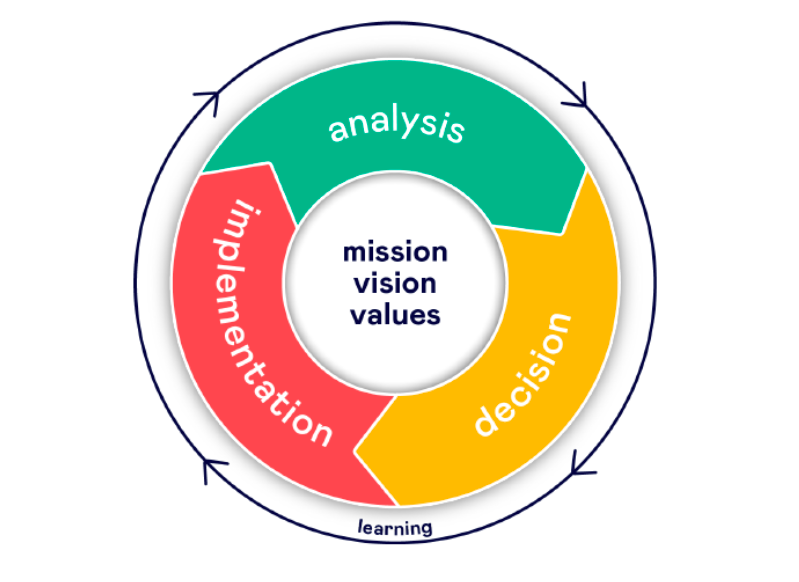The Science of Strategic Decision Making
It’s common knowledge - leaders make strategic decisions on a daily basis. Every single decision they make, whether big or small, determines the future of their team and how they perform, and of course, determines the future of the entire organisation.
With such an important role and with so much at stake if unfavourable decisions are made, it’s crucial for leaders to understand the science of strategic decision making and even more important to familiarise themselves with the precise decisions that have proven to achieve success and those that may not.
What is strategic decision-making?
Strategic decision making is the decisions made according to a company’s mission, vision and values. They’re the decisions that impact various key areas of an organisation and ultimately determine its success. The making of strategic decisions depends on the position of the organisation, and what's needed to align with its vision and mission.
How to be a strategic decision-maker
Strategic decision-making requires out-of-the-box thinking and foresight. Leaders need to think of the bigger picture, the future impacts of their decisions, while solving problems today.
For example, leaders may be concerned with the level of employee engagement within the organisation as results and performance seem low. An inexperienced leader will try to address poor results and performance by attacking it head-on, perhaps giving their people a ‘pep talk’ or an ultimatum, for example. An inexperienced leader may think this is the best approach because it's an immediate, quick-fix solution to save results and boost performance. However, an experienced leader knows this is only a short-term solution if a solution at all! The real way to address issues is to gather data. How do employees feel? What's really driving poor performance? Are there underlying issues that need to be addressed first?
The science of strategic decision making

Mission, vision, values
When it comes to anything strategic, the organisation’s mission, vision and values are the guiding light. Strategic decisions should always be made according to hard data and preestablished roadmaps. Many leaders would rather not consider the mission, vision and values of the organisation before making decisions, because quick-fix solutions often don’t align with them, which is inconvenient at the best of times. To avoid this dilemma, leaders shouldn’t wait for problems to arise before taking action, instead, they should be proactive. One incredibly effective way of being proactive and avoiding problems is by conducting employee pulse surveys. This provides leaders with regular feedback from their people, so that they can spot signs of weakness and concern and make changes before problems arise.
Analysis
Before leaders make decisions they analyse the problem and the possible solutions. Analysis is the first step in the decisions-making process and arguably the most important because data used to make and implement decisions is gathered during this phase. With inaccurate data, or not enough data, leaders are at risk of making the wrong strategic decisions which will cause catastrophic damage to the team and organisation. Going back to the example of employee engagement surveys and pulse surveys, leaders have a sure way of receiving accurate data from their people, including how they feel, their needs, concerns and expectations. This kind of data helps leaders to analyse with greater clarity and accuracy for enhanced decision-making. This achieves incredible results as decisions made based on such precise and accurate data are not often wrong.
Decision
Making decisions is actually the easy part, but of course it comes with great risk. It’s ‘easy’ because making the decision is just a matter of committing to one route over another - which the data decides. What’s risky about this phase is committing to a decision that could be totally wrong. To minimise the risk though, leaders should always gather as much accurate data as they possibly can in the analysis phase. Data is the secret to strategic decision-making.
Implementation
Implementation speaks for itself. It’s the final stage of the decision-making process and the phase that’ll soon enough determine the long-term impact of the decision. If leaders don’t feel totally confident at this stage, they either:
- Haven’t gathered enough data to rely on
- Have failed to consider and be led by the organisation’s mission, vision and values
- Have settled on a quick-fix solution without considering long term impacts
- Aren’t leading proactively, but instead waiting for problems to arise



